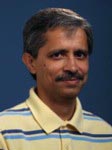Date
Cost
Free and open to the public
Location
Harris Corporation Engineering Center, Room 101A
Description
Nanostructures, such as nanowires, nanobelts, nanosprings and nanotubes, are receiving growing interest as transducer elements of bio/chemical sensors as they provide high sensitivity, multiplexing, small size and portability. Single walled carbon nanotubes (SWNTs) and graphene are one such class of nanostructure material that exhibit superior sensing behavior due to their large surface carbon atoms that are highly responsive to surface adsorption events. Further, their compatibility with modern microfabrication technologies, facile functionalization with molecular recognition elements make them promising candidates for bio/chemical sensors applications.
In this presentation, I will report our recent results on nanosensors based on SWNTs and graphene film and nanomesh combined with biological receptors such as aptamers, antibodies and binding proteins, and chemical receptors such as conducting polymer, metals and metal nanoparticles to develop highly sensitive, selective, rapid and cost-effective label-free chemiresistor/field-effect transistor nano-bio/chemical sensors for applications in health care, homeland/personal security, environmental monitoring, etc.
Biography
Dr. Ashok Mulchandani is a Professor in the Department of Chemical and Environmental Engineering at the University of California and the Editor-in-Chief of the Applied Biochemistry and Biotechnology journal. He is elected Fellow of the American Association for Advancement of Science and the American Institute for Medical and Biological Engineering. He has received several honors and awards including Research Initiation Award from the national Science Foundation and Faculty Participation Award from the Department of Energy. He has delivered several Plenary and Keynote lectures. Prof. Mulchandani has published over 225 peer-reviewed journal publications, 13 book chapters, 12 conference proceedings articles, over 200 conference abstracts and edited four textbooks. Prof. Mulchandani’s primary research interest is in the broad area of “Bio-Nanotechnology” with goals of developing novel (bio)analytical devices/assays, (bio)remediation technologies and (bio)nanomaterials.
Presenter

Ashok Mulchandani
Department of Chemical and Environmental Engineering
University of California, Riverside
More information
Light refreshments will be served
Contact
Ushaben Lal NanoScience Technology Center 407-882-0032 usha@ucf.edu